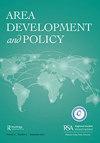A magic formula for economic development? Global market integration and spatial polarization in extractive industries
IF 1.8
Q3 DEVELOPMENT STUDIES
引用次数: 10
Abstract
ABSTRACT The World Bank, World Trade Organization and others promote integration into global markets as a certain path towards economic development. Some researchers share this optimism, arguing that development is the record of how one thing leads to another, once peripheral locations have plugged into global networks. Comparing resource peripheries in South America, Southeast Asia and Sub-Saharan Africa with regard to the upstream oil and gas sector, we call for a more nuanced assessment. Against the backdrop of 38 narrative, open-ended interviews, we show that there is spatial polarization between ‘gateways’ and peripheral sites in Southeast Asia. Argentinean and Ghanaian case studies reveal that local firms usually provide generic services, with little prospects of venturing into higher value-adding activities. We conclude that at least the oil and gas sector is not suitable for fulfilling very optimistic expectations on development.经济发展的神奇公式?全球市场一体化与采掘产业空间极化
摘要世界银行、世界贸易组织和其他组织推动融入全球市场,将其作为经济发展的特定途径。一些研究人员也持这种乐观态度,认为一旦周边地区接入全球网络,发展就是一件事如何导致另一件事的记录。将南美洲、东南亚和撒哈拉以南非洲的资源周边地区与上游石油和天然气部门进行比较,我们呼吁进行更细致的评估。在38次叙述性、开放式采访的背景下,我们发现东南亚的“门户”和周边网站之间存在空间两极分化。阿根廷和加纳的案例研究表明,当地公司通常提供通用服务,很少有机会从事更高附加值的活动。我们的结论是,至少石油和天然气部门不适合实现对发展的非常乐观的期望。
本文章由计算机程序翻译,如有差异,请以英文原文为准。
求助全文
约1分钟内获得全文
求助全文

 求助内容:
求助内容: 应助结果提醒方式:
应助结果提醒方式:


